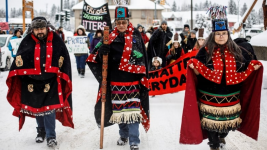A First Nations community in B.C. has signed an agreement with Coastal GasLink Pipeline that is worth approximately $2.8 million.The 650-km pipeline will transport natural gas from the Dawson Creek area to the proposed LNG Canada facility near Kitimat.
The Wet'suwet'en First Nation is located in the central interior of B.C.
"We have agreed to LNG projects - but maintain our opposition to oil projects in our territory," Wet'suwet'en First Nation Chief Karen Ogen said in a statement.
"In our current agreement with Chevron and Coastal Gas Link, we have ensured the inclusion of the clause which states at no time will this pipeline agreement, even if sold to another company, be converted to transporting oil or bitumen."
She said the community remains opposed to oil pipelines "because of their serious potential environmental impacts on our territories and traditional hunting grounds.
"This is liquefied natural gas, which has minimal risk during its transportation through these pipelines. We are confident that this opportunity will be beneficial not only to WFN but many other progressive nations as well."
B.C. Minister of Aboriginal Relations and Reconciliation John Rustad said First Nation communities had been left out of economic growth in the province for too long.
"It's exciting to be able to partner with First Nations like the Wet'suwet'en so they can share in the benefits of a new LNG export industry - stronger economies, good-paying jobs and collectively working to establish environmental legacies made possible by LNG development," Rustad said.
Sun News : B.C. First Nation signs multimillion-dollar deal with gas pipeline company
The Wet'suwet'en First Nation is located in the central interior of B.C.
"We have agreed to LNG projects - but maintain our opposition to oil projects in our territory," Wet'suwet'en First Nation Chief Karen Ogen said in a statement.
"In our current agreement with Chevron and Coastal Gas Link, we have ensured the inclusion of the clause which states at no time will this pipeline agreement, even if sold to another company, be converted to transporting oil or bitumen."
She said the community remains opposed to oil pipelines "because of their serious potential environmental impacts on our territories and traditional hunting grounds.
"This is liquefied natural gas, which has minimal risk during its transportation through these pipelines. We are confident that this opportunity will be beneficial not only to WFN but many other progressive nations as well."
B.C. Minister of Aboriginal Relations and Reconciliation John Rustad said First Nation communities had been left out of economic growth in the province for too long.
"It's exciting to be able to partner with First Nations like the Wet'suwet'en so they can share in the benefits of a new LNG export industry - stronger economies, good-paying jobs and collectively working to establish environmental legacies made possible by LNG development," Rustad said.
Sun News : B.C. First Nation signs multimillion-dollar deal with gas pipeline company

